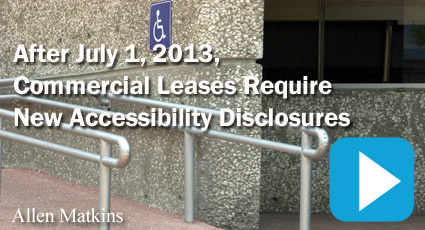News & Insights
Legal Alert

Action Required by California Commercial Landlords: New California Law Goes Into Effect July 1, 2013, Requiring Accessibility Disclosures in Commercial Leases
Real Estate
4.12.13
On July, 1, 2013, Civil Code Section 1938 goes into effect and requires commercial leases executed on and after such date to disclose whether the premises being leased have been inspected by a Certified Access Specialist, and if so, whether the inspected premises have been determined to meet all applicable accessibility requirements.
Watch the video
Senate Bill 1186, signed into law in September 2012, is intended to provide California landlords, tenants and business owners with added protection against predatory lawsuits based on alleged violations of construction-related disability access laws.
Much of SB 1186 focuses on:
-
stricter procedures which need to be followed by plaintiff attorneys in pursuing alleged violations of construction-related disability access laws, and
-
protecting businesses sued for alleged violations by, under certain circumstances, allowing for a stay of litigation and/or a reduction of the minimum statutory damages that can be awarded.
The availability of some of the protections granted under SB 1186 turns on whether the subject property has been evaluated by a Certified Access Specialist (CASp) for compliance with applicable disability access requirements.
Our prior alert, California Property and Business Owners Gain Protection from Predatory ADA Lawsuits, dealt primarily with the stricter procedures to be followed by plaintiffs pursuing claims under violations of disability access laws, and the reduced statutory damages framework. These portions of the law became effective on January 1, 2013.
The SB 1186 disclosure requirements codified in Civil Code Section 1938 have not yet taken effect, and affect all commercial property landlords in California, whether or not they are ever sued for violating any accessibility standards. This Legal Alert focuses on the new disclosure requirement for commercial leases.
Mandatory Disclosures for Commercial Leases
SB 1186 expressly requires that all commercial leases executed on and after July 1, 2013, disclose whether the subject premises have been inspected by a CASp, and if so, whether the inspected premises have been determined to meet all applicable accessibility requirements. Specifically, Section 12 of SB 1186 created the new disclosure requirement by adding Section 1938 to the California Civil Code which provides as follows:
“A commercial property owner or lessor shall state on every lease form or rental agreement executed on or after July 1, 2013, whether the property being leased or rented has undergone inspection by a Certified Access Specialist (CASp), and, if so, whether the property has or has not been determined to meet all applicable construction-related accessibility standards pursuant to Section 55.53.”
Information on whether a property has undergone inspection by a CASp, and whether the property has been found to meet applicable accessibility requirements is relevant to tenants since tenants, in addition to landlords, are often named as plaintiffs in accessibility lawsuits. Accordingly, tenants have an interest in knowing whether their leased premises have been inspected and deemed compliant by a CASp to determine whether they may benefit from the protections granted under SB 1186.
It is important to remember that the new law does not require commercial property owners to have CASp inspections performed on their properties – it simply requires that they state in their leases executed on or after July 1 whether or not they have done so; and if so, whether the property meets the applicable accessibility standards. A disclosure in a commercial lease that the premises have not been CASp inspected may prompt the tenant to request that the landlord undertake such inspection, or the tenant may agree to undertake such inspection on its own (both of which are likely intended results from the legislation) in order to receive the benefits under SB 1186.
Action Items
The July 1, 2013, deadline set forth in the new Civil Code Section 1938 is rapidly approaching.
Landlords of commercial property should consult with experienced real estate counsel to:
-
Determine whether their property has been inspected by a CASp and to evaluate the findings of such inspection;
-
Based on whether or not a CASp inspection has been performed, draft and incorporate appropriate provisions into their commercial leases executed on or after July 1 to comply with Civil Code Section 1938; and
-
Review other relevant provisions of their commercial lease form, including compliance with law and indemnity provisions, to ensure the lease appropriately allocates accessibility related risk between Landlord and Tenant.
Authors
Partner
Partner
RELATED SERVICES
RELATED INDUSTRIES
Allen Matkins Leck Gamble Mallory & Natsis LLP. All Rights Reserved.
This publication is made available by Allen Matkins Leck Gamble Mallory & Natsis LLP for educational purposes only to convey general information and a general understanding of the law, not to provide specific legal advice. By using this website you acknowledge there is no attorney client relationship between you and Allen Matkins Leck Gamble Mallory & Natsis LLP. This publication should not be used as a substitute for competent legal advice from a licensed professional attorney applied to your circumstances. Attorney advertising. Prior results do not guarantee a similar outcome. Full Disclaimer




